The ICC Together with the United Nations in China and the Brazilian Embassy in China Hold the Preparatory Meeting for COP30
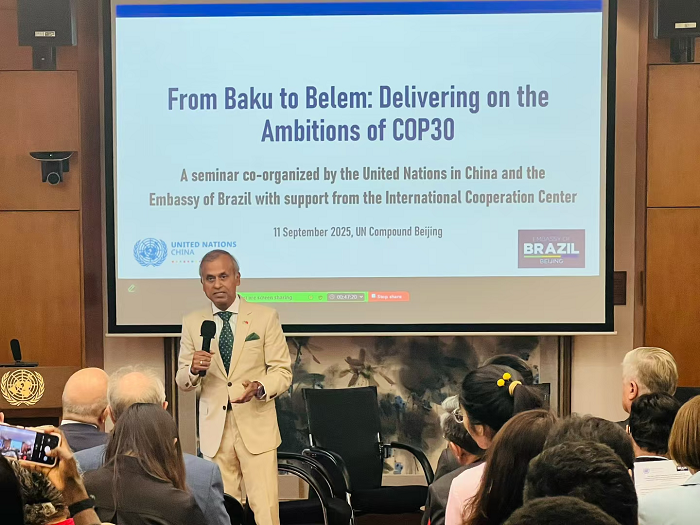
Mr. Siddharth Chatterjee made speech
On 11 September 2025, the United Nations in China, the Brazilian Embassy in China, and the International Cooperation Center (ICC) jointly held a preparatory seminar for the 30th Conference of the Parties to the United Nations Framework Convention on Climate Change (COP30) in Beijing. Yang Lin, Deputy Executive Secretary of the United Nations Economic and Social Commission for Asia and the Pacific, delivered a video address. Siddharth Chatterjee, the United Nations Resident Coordinator in China, Marcos Galvao, the Brazilian Ambassador to China, and Zhang Zhixiang, Member of the Strategic Advisory Committee of the ICC and the President of the International Monetary Research Committee, delivered speeches respectively; Ana Toni, the Chief Executive Officer of the COP30 and the Secretary of State for Environment and Climate Change of Brazil, and Beate Trankmann, the Representative of the United Nations Development Programme (UNDP) in China, delivered keynote speeches. Senior government officials, diplomatic envoys, heads of United Nations agencies in China, and scholars from over 50 countries and regions attended this meeting.
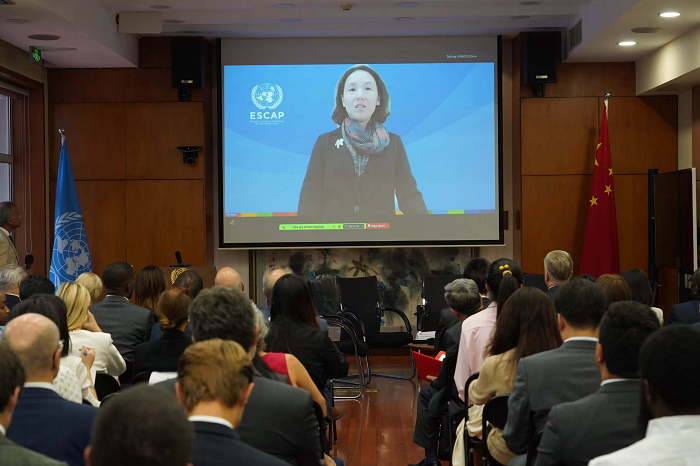
Ms. Yang Lin made speech online
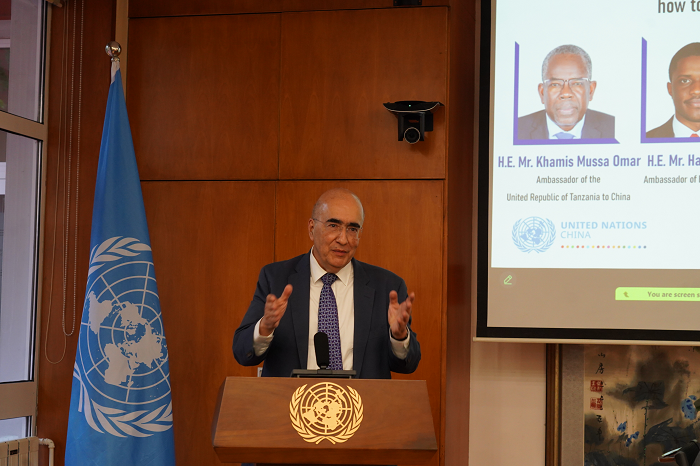
Mr. Marcos Galvao made speech
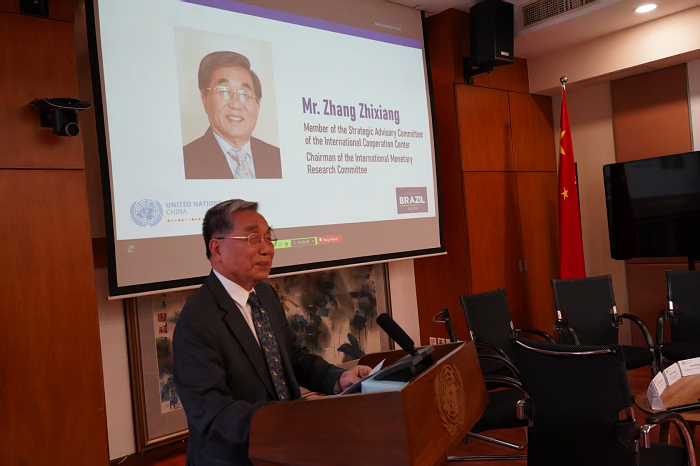
Mr. Zhang Zhixiang made speech
Zhang Zhixiang delivered a speech titled "Strengthening Multilateralism and Deepening International Cooperation on Climate Change" on behalf of the ICC. He expressed his pleasure to discuss this important topic with representatives from the United Nations in China, the Brazilian Embassy in China, and other countries' envoys on the eve of the COP30 and on the 10th anniversary of the Paris Agreement. Climate change is a common challenge faced by all mankind. Addressing this crisis is conducive to building a fair and shared prosperity human community. Whether the international community can jointly handle this challenge well will determine the future of humanity. On 23 April 2025, President Xi Jinping delivered a speech at the Video Summit of Leaders on Climate and Just Transition. From the perspective of safeguarding the common and long-term interests of humanity, China deeply grasped the current situation and tasks of global climate governance, and put forward a series of important initiatives and propositions, injecting confidence and strength into promoting international cooperation and building a clean, beautiful and sustainable world.
Zhang Zhixiang pointed out that to promote global governance of climate change, principles of fairness, common but differentiated responsibilities and respective capabilities should be adopted. In the process of addressing global climate change, climate financing has always been one of the key links. The launch of the "Baku to Belén $1.3 trillion roadmap" is an important milestone in global climate action, providing financial support for developing countries to achieve sustainable development and injecting new impetus into global climate governance. Through this roadmap, all countries and relevant parties will work together to explore innovative financing methods, break the limitations of traditional financing models, and provide stronger financial guarantees for global climate action. All parties involved need to strengthen cooperation to ensure that the goals of the roadmap can be achieved. Only through the collaborative efforts of all parties can we truly achieve sustainable development of global climate action and create a better future for future generations.
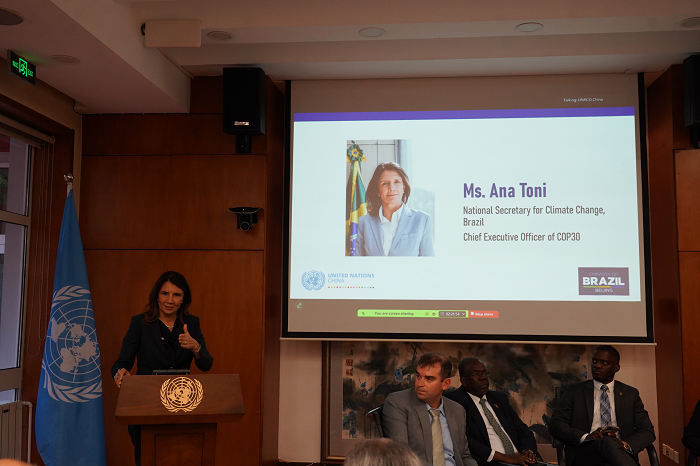
Ms. Ana Toni made speech
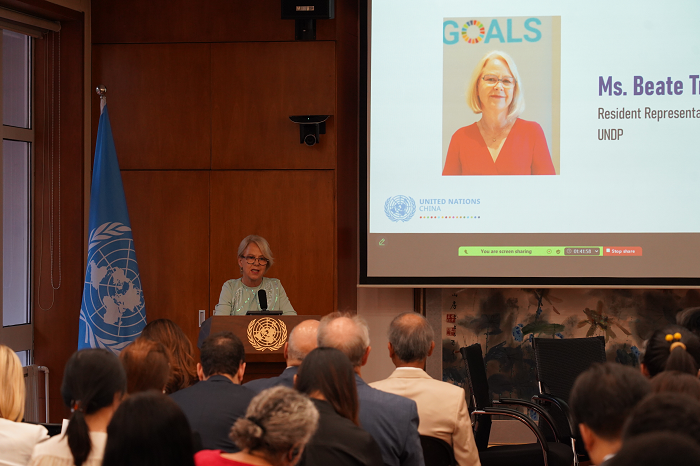
Ms. Beate Trankmann made speech
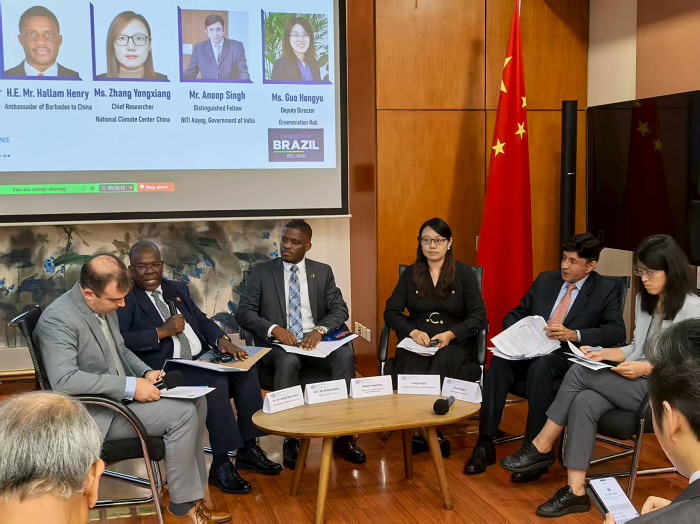
Roundtable discussion
It is well known that climate change is one of the greatest challenges we are facing in this era. Marked by the official entry into force of the United Nations Framework Convention on Climate Change, which serves as the cornerstone of global climate governance, looking back over the past 30-plus years of the world, the scope of global climate governance has continuously deepened, and the governance mechanisms at multiple levels and involving multiple stakeholders have continuously evolved and intricately intertwined. Currently, climate change and its various levels of cooperative governance mechanisms have become one of the governance issues that the international community is paying close attention to. Global climate governance should firmly uphold true multilateralism, deepen international cooperation; adhere to international law as the foundation, fairness and justice as the essence, and effective actions as the orientation, maintain the international system centered on the United Nations, and follow the goals and principles of the United Nations Framework Convention on Climate Change and the Paris Agreement. The International Cooperation Center will take the 30th Conference of the Parties to the United Nations Framework Convention on Climate Change as an opportunity to deeply analyze the complex situation and severe challenges faced by the world today, and promote the development of the global governance system in a more just and reasonable direction.
The COP30 will be an important platform to showcase hope and the path of transformation to the world. In view of this, in January 2025, the delegation of the ICC was invited to visit the Federal Government of Brazil and the Amazon Development Administration (SUDAM); in April, Zhang Yu, the Convener of the Joint Meeting and Director of the Steering Committee of the ICC, exchanged views on multilateral cooperation and climate change with China's Special Envoy for Climate Change Liu Zhenmin, the UN Resident Coordinator in China Siddharth Chatterjee, the Brazilian Ambassador to China Marcos Galvao, and the President-elect of COP30 André Corrêa do Lago; in June, during the visit of the ICC's Asia-Pacific Affairs Special Representativey Mu Dong to Brazil, he handed over a Note from the ICC to Brazilian Vice President Geraldo Alckmin. In the note from the ICC to the Brazilian side, it was suggested that before COP30, the ICC, the UN system in China, and the Brazilian Embassy in China should hold a "Preparatory Meeting for COP30".
Background:
The 30th Conference of the Parties (COP30) of the United Nations Framework Convention on Climate Change will be held in Belém, Brazil from November 10th to 21st, 2025. At that time, leaders from 198 countries around the world, scientists, non-governmental organizations, and representatives from all parties will gather together to discuss the priority actions to address climate change. The COP30 will focus on the efforts required to limit the global temperature increase to within 1.5°C, the submission of new national action plans (national commitments), and the progress of the financing commitments made at the 29th Conference of the Parties.
Every year, the countries that join the Conference of the Parties (COP) of the United Nations Framework Convention on Climate Change hold meetings to assess progress and negotiate multilateral responses to climate change. Currently, the convention has 198 contracting parties. The United Nations Framework Convention on Climate Change (UNFCCC) was a multilateral treaty adopted in 1992 shortly after the Intergovernmental Panel on Climate Change (IPCC) released its first assessment report, aiming to stabilize greenhouse gas concentrations at "levels that prevent dangerous anthropogenic (human-induced) interference with the climate system".
The host country of the Conference of the Parties (COP) of the United Nations Framework Convention on Climate Change is usually rotated among the five regional groups of the United Nations (Africa, Asia-Pacific, Eastern Europe, Latin America and the Caribbean, and Western Europe and Other Regions), and the country from the region that the group members decide to propose as the host is determined. The United Nations Climate Change Conference has set a global milestone for the climate movement, established standards, and advanced actions, including reducing carbon emissions, accelerating the global energy transition, and helping countries adapt and build the capacity to cope with complex climate issues.
Related link:
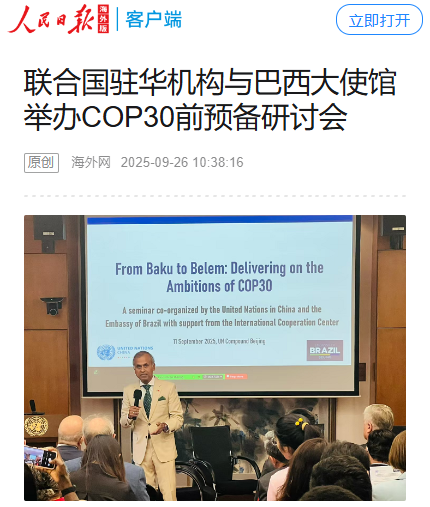
https://mk.haiwainet.cn/n/2025/13A/011E1214794275480032698.html

